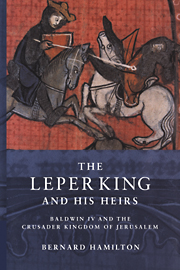Book contents
- Frontmatter
- Dedication
- Contents
- List of illustrations
- Acknowledgements
- List of abbreviations
- Maps
- Genealogies
- Glossary
- Prologue
- 1 The sources for Baldwin IV's reign
- 2 Baldwin's childhood
- 3 The kingdom
- 4 The international status of the kingdom
- 5 The king's minority
- 6 Western aid. William of Montferrat and Philip of Flanders
- 7 The victor of Mont Gisard
- 8 Prince Reynald's initiative
- 9 The dying king
- 10 The heirs of the leper king
- Epilogue
- Appendix An evaluation of the leprosy of King Baldwin IV of Jerusalem in the context of the medieval world
- Bibliography
- Index
6 - Western aid. William of Montferrat and Philip of Flanders
Published online by Cambridge University Press: 05 February 2015
- Frontmatter
- Dedication
- Contents
- List of illustrations
- Acknowledgements
- List of abbreviations
- Maps
- Genealogies
- Glossary
- Prologue
- 1 The sources for Baldwin IV's reign
- 2 Baldwin's childhood
- 3 The kingdom
- 4 The international status of the kingdom
- 5 The king's minority
- 6 Western aid. William of Montferrat and Philip of Flanders
- 7 The victor of Mont Gisard
- 8 Prince Reynald's initiative
- 9 The dying king
- 10 The heirs of the leper king
- Epilogue
- Appendix An evaluation of the leprosy of King Baldwin IV of Jerusalem in the context of the medieval world
- Bibliography
- Index
Summary
William Longsword of Montferrat reached the Holy Land at the beginning of October 1176 escorted by a Genoese fleet. Giuseppe Ligato is probably right in arguing that no specific promises had been made to him during the marriage negotiations about his future constitutional position in the Latin Kingdom, although almost certainly the assumption must have been that he would become king either when Baldwin died, or when he became too ill to rule: for Baldwin could not marry and beget a legitimate heir because it was believed that leprosy could be sexually transmitted. William of Tyre reports that William's marriage was ‘unwelcome to and openly opposed by certain of those men by whose advice he had been summoned [to Jerusalem]’. Although he does not give any reason for this reaction, it probably reflected the changing fortunes of Frederick Barbarossa, since the Montferrat marriage had been arranged in order to secure his protection for the Crusader States. On 29 May 1176 the emperor had been decisively defeated by the forces of the Lombard League at Legnano, and his protection then came to appear more of a liability than a benefit, since not only was he in no position to intervene in the Latin East, but he was also still at war with the pope and the king of Sicily, whose aid the Franks of Jerusalem needed. This may explain why some members of the High Court of Jerusalem were opposed to the marriage.
Nevertheless, William was so well connected that to have broken his marriage contract would have antagonised too many influential people in the West on whose goodwill the Crusader Kingdom depended, including the republic of Genoa, and perhaps King Louis VII of France. Moreover, Sibyl's marriage prospects might have been irretrievably damaged had she not married William, because she had already been rejected as a bride by Stephen of Sancerre. William's marriage to Sibyl was therefore finally solemnised in November 1176, six weeks after his arrival, and he was invested with the double county of Jaffa and Ascalon, which had formerly been the appanage of King Amalric.
- Type
- Chapter
- Information
- The Leper King and his HeirsBaldwin IV and the Crusader Kingdom of Jerusalem, pp. 109 - 131Publisher: Cambridge University PressPrint publication year: 2000



